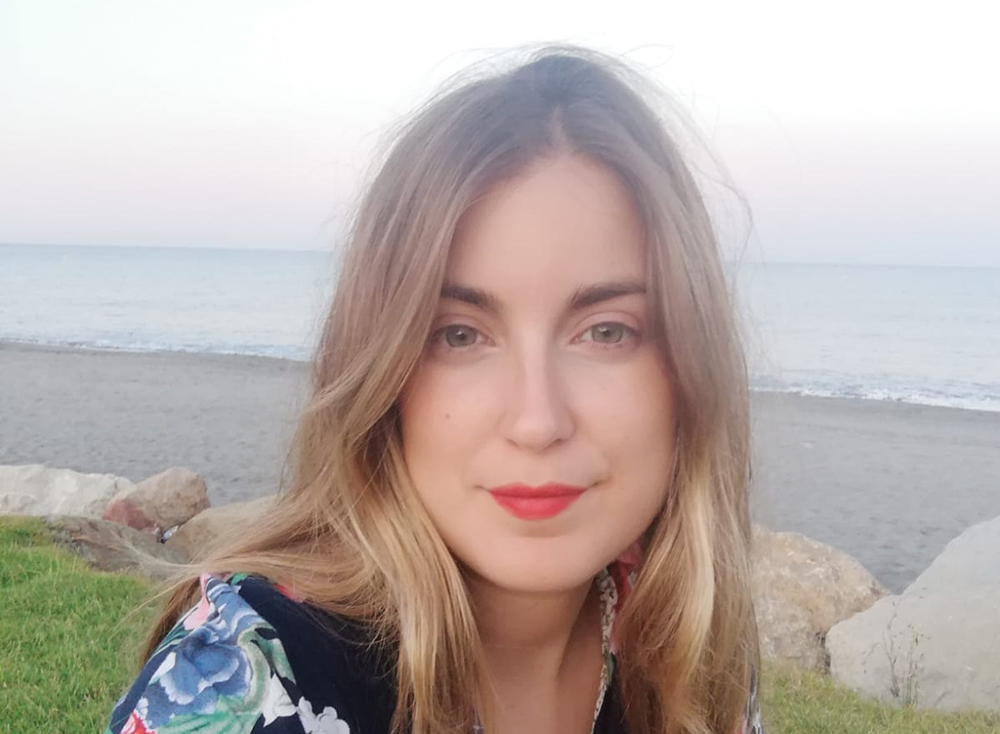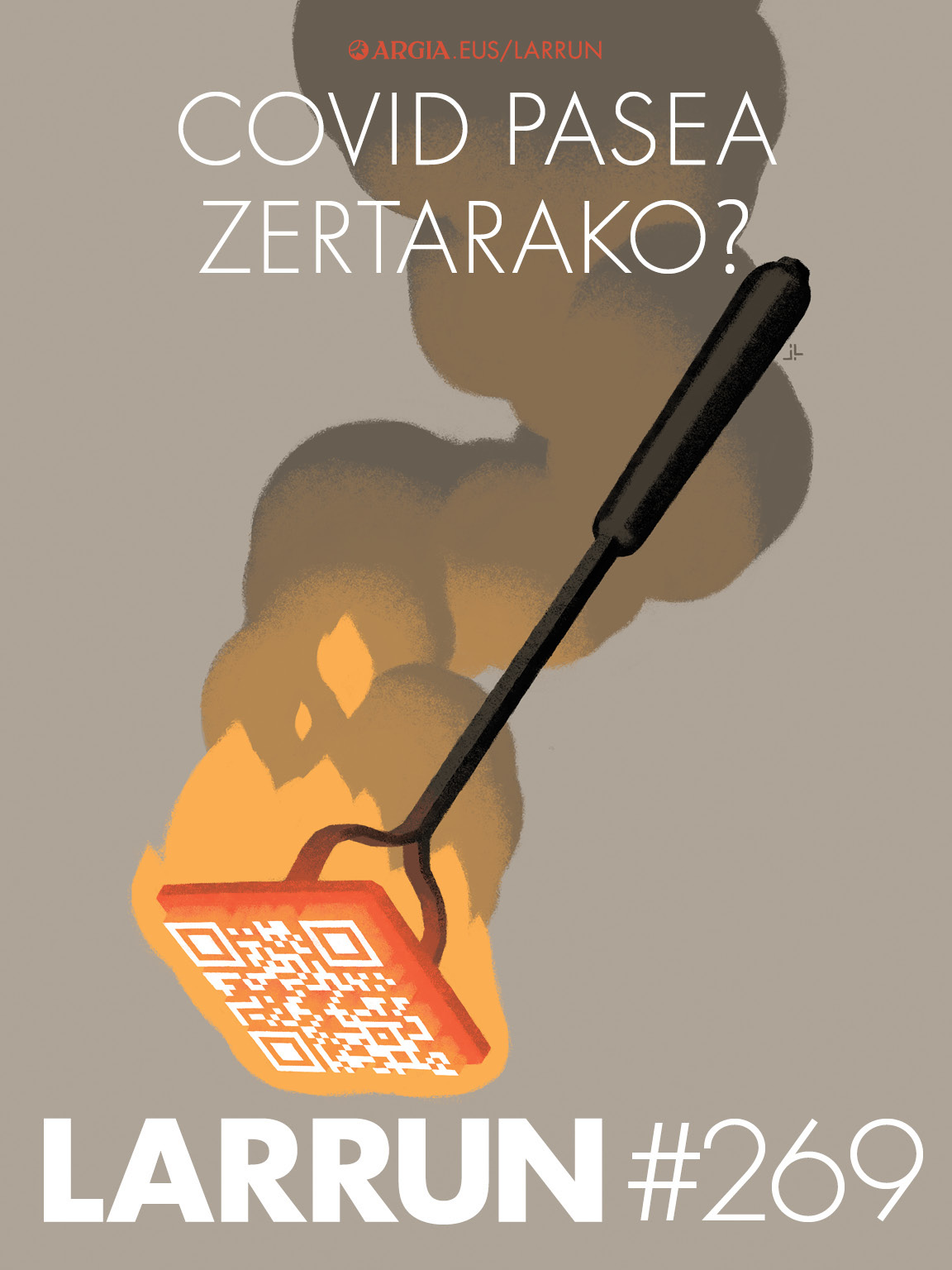"The measures being taken by the authorities do not serve those who do not have papers"
- To what extent the pandemic is hitting the collective of migrants, how they are organizing to cope with the situation, how these times of fear and emotion have incited racism and the police to the extent that the neighborhoods and spaces of the migrants are being occupied, are some of the issues we have talked to Alba García, member of SOS Racism in Bilbao. Their teaching is clear: to keep in mind the resources that are emerging in a situation of emergency, to claim them in the future.

Does the coronavirus crisis particularly affect migrants?
Yes. Economically, many work in black because they have no papers and others, so the measures being taken by the authorities (self-employed, unemployed…) do not serve them. It must be stressed that they do not do so because they want it, but because the law obliges them to do so. For three years they have to act in illegality and secrecy, and after those three years they can begin to demonstrate their roots. In this pandemic situation, many have been left without any financial support, such as the manteres. In caring for the elderly there are also many migrant women; hired caregivers in a situation without a pandemic do not have access to unemployment (precariousness reaches that point) and in this crisis they are asking politicians for some kind of help for people who are left without work, but many others are out of contract. Those will be left with nothing!
In other words, the situation of people who were already marginalized has become even worse during the pandemic.
The institutions, therefore, do not take account of the situation of migrants in their own measures. How do the protagonists themselves face the crisis?
Resistance banks (such as the Mbolo association in Bilbao) have been set up to raise funds and distribute among those in need. There are people who don't even have money to buy food. The same with renting, with the bill of light… Think about how children can follow their studies in those houses, as they do not have access to the internet.
At the level of the Spanish State, they have created the platform of Emergency Against Racism, in which we are immersed numerous associations and collectives, creating resistance boxes for the most needy, anti-racist surveillance networks, resources for sex workers, access routes to migrants who are not in any group…
“They have created an Emergency Against Racism platform to create resistance boxes for the needy, anti-racist surveillance networks, resources for sex workers, access routes for migrants who are not in any group…”
We are seeing a lot of that in this crisis. The citizens' networks cover the deficiencies left by the institutions.
Indeed, there is a lot of help among the neighbours too. Here in Bilbao, the Solidarity Networks by Neighbourhoods initiative has been launched. Or in the San Francisco neighborhood, for example, migrants have boxes in some of their stores for citizens to leave money, and the salespeople themselves are responsible for giving food to the missing.
The Portuguese Government has directly legalised the country’s paperless countries, in order to ensure, above all, that they receive health care.
We know that no one has been denied health care for being a migrant, but papers would allow them access to other rights that are important. For example, getting a census, something so basic and necessary to do a lot of management, getting access to a lot of things. Papers are also the way to work legally, to be able to pay, to have employment rights… The fact that the government helps to regularize the situation of people would make the picture easier for many, but I would be surprised if a decision similar to that of Portugal was taken in our country.
“The police repression we are experiencing these days is a way to legitimize it and to continue this repression”
What is the situation with regard to migrants in transit who do not have a home?
In addition to the shelters for migrants, sports clubs and other spaces are being prepared, both for those on the road and for those living on the street, but they are denouncing that the conditions are not good: they are overcrowded, fifty people in the same room, stressed… and when they allow them to breathe a little (they were led to play a football game in the sports club of Rekalde), they were insulted by the neighbors. But it is not reasonable, they are also overcrowded, they sleep in the same room, they have three showers for everyone… If you get infected, it will be difficult not to infect the rest.
On the other hand, the militarization of these spaces is important: the police are around them every day.
Precisely, citizens have denounced police abuses by the pandemic. Migrants are surely one of those who suffer the most…
The San Francisco district of Bilbao (where many migrants live) is a clear example: there are policemen everywhere and at all times, every day they stop by race and police abuses are continuous. The wields or insults of the police when they go to work… In my neighborhood people go out to buy bread or walk the dog and I don’t see the police. The police exhibition in San Francisco and the like is awesome, it looks like we're at war, like they're looking to scare people. We know that many neighbours are terrified by the repressive measures police can take against them. Seeing what happened on Sunday with a family in the area, the aggression occurred to a woman from the locality. If that woman had been white, without a scarf in her head, the lehendakari would leave the day after making a statement.
“The ICDs are closing, not because of human rights violations, but because borders are closed and there is no possibility of exile, because the legal conditions do not exist.”
Speaking of police abuses, the coronavirus crisis can favor more restrictive policies and mechanisms to increase citizen control. Even after the pandemic is over. Will the most vulnerable groups suffer the most?
Yes, to the same extent that there is a political strategy behind police concentration in certain neighborhoods and places. The police repression that we are experiencing these days is a way of legitimizing it and giving continuity to it. The occupation of the sidewalk by some collectives and uncomfortable colors, but on the terraces of the bars the white people are not drinking beer.
Migrant detention centres (CIE in the Spanish State, CRA in France) are called upon to have a collection of persons and to be released in the event of a health emergency. At least in the Spanish State the centres are being emptied…
Yes, some centers are already closed and others are already doing so. But not because they have become aware that human rights are being violated, but because the legal conditions are not in place for people to be held in these centres, closing borders and without the possibility of being exiled.
Nevertheless, we call for these centres to be closed even when there is no pandemic, because people who have not committed any crime and who are clearly against human rights are there detained, in conditions of extreme gravity and without any legal protection.
“The pandemic has been used to blame the migrant: they have brought the virus, they are on the street and spread the virus, that health care should be provided to the first residents…”
Are racist and xenophobic discourses on the rise during the pandemic?
Racist speeches were already there before, we know, but the pandemic has been used to blame the migrant: they have brought the virus, they are on the street and spread the virus… I have also heard that health care must be provided to the first villagers (we would also have to discuss what is from there, but good). Unfortunately, in times of crisis, where fear and emotions play an important role, people cling more easily to this type of discourse.
What clues will this crisis leave in the future? What would I highlight about everything that's happening?
The importance of groups and public services is becoming clear and I believe that this is one of the most important messages that will leave us. The pandemic has also highlighted the resources we have: for example, sports clubs have adapted from night to night to welcome people living on the street, because white lives are in danger. So in winter, why don't you do that? Or if the Spanish Government can now grant home workers a subsidy, why is it going to deny them unemployment? These are things that we have to bear in mind in order to claim them in the future too. After all, I prefer to think of the positive, because I see a lot of people becoming aware, knowing realities that were previously not as obvious as a result of the crisis.

Katalunian Societat Catalana de Pediatria elkarteak pandemia kontrolatzeko ikastetxeetan aplikatzen diren neurriak bertan behera uzteko eskatu du, neurri horiek haurrengan dituzten ondorio kaltegarriak argudiatuz. Tartean dago gela barruetan maskararen erabilera kentzea, modu... [+]
Like so many others, we went to the demonstration called in Bilbao against the passing of COVID-19. I was very happy to see how many people there were in her of different ages, colors, dresses and languages, and I found among them friends of battles from the university or... [+]
Zarauzko Udaleko urtarrileko osoko bilkuran, galdera erantzunen txandan sei herritarrek hartu zuten hitza, eta Covid pasaporteak eragindako diskriminazioa eta beren bizipenak azaldu zituzten; tartean, pasaporterik gabe kiroldegira sartzeagatik atxilotuta bukatu zuen... [+]
Bermeon jaiotako eta bertara etorritako herritarren artean hilean behin egiten zuten tertulia dago Lurre Hurre proiektuaren oinarrian. Elkar ezagutu zuen herritar talde horren harremanetik abiatuta, eta konfinamendu garaian migratzaile askok bizi zuten egoeraz jabetuta, egitasmo... [+]
Joseph Andras (Le Havre, Frantzia, 1984) idazlea da. 2016an lehen eleberriagatik "Goncourt" sari famatua eman zioten, baina berak uko egin zion epaimahaiari esanda “lehia, konkurrentzia eta norgehiagoka arrotzak zaizkiela idazketari eta sorkuntzari”... [+]
Lehen mailako arretak “kolapso egoeran” jarraitzen duela uste dute, ospitaletako arretak bizi duen gainkarga salatu nahi dute, eta egoerari aurrea egiteko neurriak eskatzen dituzte ELA, SATSE, LAB, CCOO eta UGT sindikatuek.
Abenduaren 20an eman zuen jakitera Olentzeroren Lagunak elkarteak 2021ean ere ez zela Olentzero Iruñeko kalez kale ibiliko, pandemiaren egoerak horretara bultzatuta. Urtarrilaren 4an, aldiz, Iruñeko Errege Magoen Kabalkadaren Elkarteak adierazi du aurten kaleetara... [+]
Honela adierazi du Gazte Koordinadora Sozialistak zabaldu duen oharrean: "Zentzu sanitariorik gabeko neurriak hartzen jarraitzen dute politikari profesional despotikoek". Berriki hartutako hiru neurriak salatu dituzte zehazki: COVID ziurtagiriaren zabalpena, aire... [+]
Osakidetzaren lehen mailako arretaren egoera "jasanezina" dela salatuz Araba, Bizkai eta Gipuzkoako osasun etxeen aurrean elkarretaratzeak egin dituzte. "Lehen olatua izan eta urte eta erdira, osasungintza urria, nekatua eta baliabiderik gabea daukagu",... [+]
LAB sindikatuak honako irakurketa plazaratu du: "COVID kutsatzeen olatu berria dela eta, Eusko Jaurlaritza, Nafarroako Gobernua eta Frantziako Gobernua COVID ziurtagiriaren ezarpena erabiltzen ari dira euren kudeaketaren hutsuneak ezkutatzeko. Bost ardatzetan neurriak... [+]
Urtero Bilboko Konpartsek San Tomas egunaren harira argitaratzen duten egutegiaren etekinak Etxaldeko Emakumeei emango dizkiete aurten.
Abenduaren 18 arratsaldean Donostian jendetzak hartu ditu kaleak, Bizitza plataformak deituta egin den manifestazioan. "COVID pasearen inposaketari ez" lemak elkartu ditu.
Abenduaren 14an Osasun Publikoaren Aldeko Herri Ekimenak 1.000 erreklamaziotik gora aurkeztu ditu Donostiako Eusko Jaurlaritzako Osasun sailean, bereziki Lehen Arreta eta oro har osasungintza publikoa indartzeko eta duintzeko eskatuz: "Osasun sistema publiko,... [+]
Gazte Koordinadora Sozialistak deituta, protestara jo dute ostiralean Bilbon, Donostian eta Gasteizen. 'Covid ziurtagiriari ez! Burgesiaren ofentsibari aurre egin' izan dute aldarri milatik gora lagunek.






















